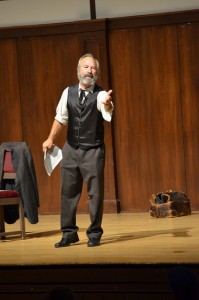
Kilat Fitzgerald / Winonan
Karl Marx was a guest in the Harriet Johnson Auditorium Tuesday, Sept. 13.
The one-man play, “Marx in Soho, ”written by historian Howard Zinn, was a humanization of the 19th century figure. The performance featured Bob Weick in the role of Karl Marx, and displayed the ideals of the German philosopher and economist, many of which have been applied to the modern struggle in today’s political atmosphere.
The dialogue took a frank approach by addressing the audience from the very beginning, breaking the fourth wall and proceeding in a conversational tone.
“Why have I returned? To clear my name,” Weick said in the role of Marx. “I’ve been reading your newspapers. They’ve all been concluding that my ideas are dead. It’s nothing new, these clowns have been saying this for over 160 years. Don’t you wonder, why is it necessary to declare me dead again and again?”
Weick was fully immersed in his representation of Marx, taking on the subtle tendencies of an oppressed scholar. The story told the tales of persecution, censorship, poverty and other class struggles that Marx dedicated his life to. By handling such material completely on his own, Weick captured the woes of Marx while also exhibiting a fiery passion for civil rights and social justice.
“Most of us recognize that we can do better as a country, and this play has something to say about that,” Weick said after the performance.
The title, “Marx in Soho,” refers to the area that he once lived. The character, though dead, has returned to prove that his ideas are not. Armed with a briefcase filled with modern-day newspaper clippings, textbooks and a bottle of beer, the iconic economist analyzed society and how he tried to change it.
The points made were considered radical by many during the time of inception, but they fell in line with much of the rhetoric heard on this year’s presidential campaign trail. The sentiments of economic marginalization and political corruption is not an issue that has yet been solved.
“We are in the midst of an election season, and there is a lot more awareness and activism taking place that I think feeds into interest in alternative systems,” sociology professor Craig Upright said. “One of my primary goals is to get students to question the society they inherited. To challenge authority figures that give them easy answers.”
Marx was exiled from his birthplace in present day Germany for writing editorials protesting policies against the poor and criticizing the lack of press freedom in Germany.
“They decided to prove me right,” Weick said. “They shut us down. Only then did we become radical… Our final issue had a huge headline in red ink: ‘REVOLT!’ That annoyed authorities.”
The proletariat issues of government representation and wealth inequality still apply today, and the play made direct connections to today’s capitalist market system. It also addressed the difference in Marx ideology from the regime of the Soviet Union, with Marx asking “Do these idiots know what communism is? Do they think a system run by a thug who murders his fellow revolutionaries is communism?”
Weick advised that in order to have true grassroots democracy, it has to start from the bottom to the top.
“Social revolutions are more important than elections,” Weick said.
-By Kilat Fitzgerald





























































